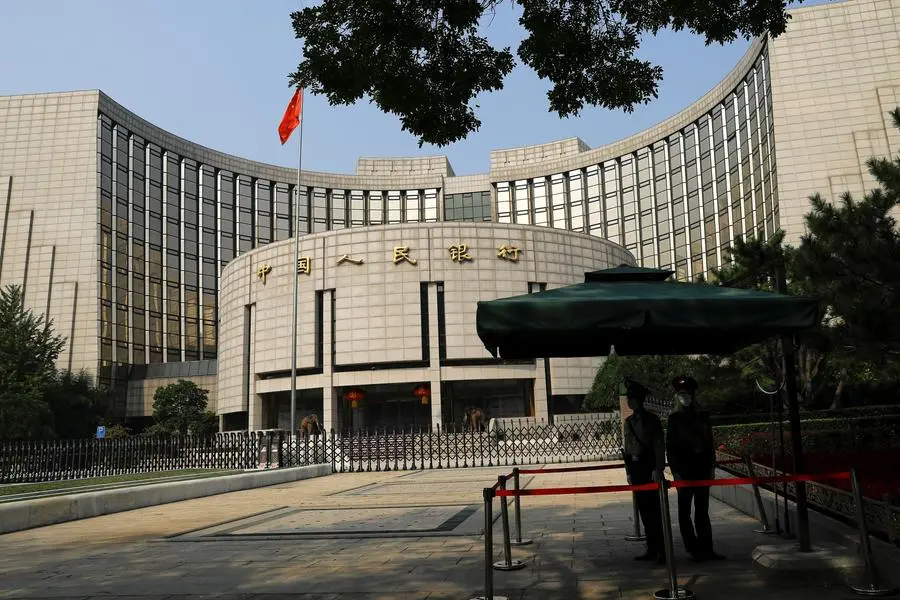PHOTO
SHANGHAI/BEIJING - China's central bank faces a looming test of its resolve to curb the financial stability risks it sees in a rallying bond market as it runs counter to its view of the economy by depicting a long-term outlook of soft growth and low inflation.
The People's Bank of China, which has pledged to add treasury bond trading to its monetary policy toolkit, has issued repeated warnings against plummeting yields in long-dated government bonds, but has failed to reverse the trend.
Pressure is growing on the PBOC to back statements with action - meaning it would be forced to end a 17-year absence from the bond market by selling. Due to its small war chest, some traders and investors say it could even short-trade treasuries by borrowing to sell.
But the central bank appears to be caught between a rock and a hard place.
For starters, such operations would withdraw liquidity from the system at a time when most analysts say the economy could do with more support to safeguard its path towards China's 2024 growth target of around 5%.
But doing nothing also implies tolerating the risk it flagged, mainly that regional banks' appetite for long-dated bonds is the type of trade that led to the collapse of the Silicon Valey Bank in the United States last year once the market turned. Analysts also say the PBOC is worried lower yields may heap more selling pressure on the yuan and cause capital flight.
This conundrum highlights the difficulty Chinese policymakers face in maintaining both ambitious growth targets and financial stability after decades of debt-fuelled expansion.
"Individual bond investment decisions collectively translate into risks for the central bank's dual mandate of supporting the economy and heading off financial risks," said Xia Haojie, analyst at Guosen Futures.
"A laissez-faire approach could lead to systemic risk."
The PBOC did not immediately respond to a comment request.
Ten- and 30-year yields have fallen 30-40 basis points from this year's highs to 2.30% and 2.53%, respectively. The PBOC's warnings against falling yields in recent months have coincided with similar levels.
CRYING WOLF?
Market expectations of PBOC bond trading took a 180-degrees turn within less than three months.
When an October 2023 speech by President Xi Jinping instructing the PBOC to slowly increase treasuries trading surfaced in late March, it sparked speculation of Federal Reserve-style quantitative easing.
Later, the PBOC clarified trading goes both ways. Soon after, it expressed concern over falling yields, drawing comparisons with the Silicon Valley Bank. Its latest warning came in a May 30 statement to Reuters saying it will "sell bonds when necessary," its strongest language so far.
A subsequent rise in yields was short-lived, suggesting markets are testing whether the PBOC is crying wolf.
After all, the PBOC only holds 1.52 trillion yuan ($210 billion) worth of bonds, about 5% of the treasury bonds in circulation and 1.4% of all the local bond holdings worth $14.6 trillion by Chinese entities.
"Fighting bond investors is an unenviable task," said a bond fund manager, asking for anonymity due to the topic's sensitivity.
"I hope the central bank starts selling bonds soon, because if its credibility crumbles it would be costly to rebuild," he said, adding the PBOC can also short-trade the bonds.
The appetite for long-term government bonds is fed from multiple directions, analysts say.
Worries over deflation and uneven growth push investors towards safer assets. The property crisis and a crackdown on municipal debt limit investment alternatives.
"Protecting wealth should be prioritised over increasing wealth," said Li Zhao, head of investment at hedge fund house White Whale Investment.
Deposit rate cuts aimed at encouraging spending and borrowing are redirecting household and corporate savings into wealth management products which channel money into bonds.
Regional banks face weak demand for loans in sluggish small-city economies, leaving them few choices but to increase bondholdings and expose themselves to risks of a market turnaround.
"The 4,000 or so small and medium-sized banks will be particularly vulnerable to interest rate risks," said Larry Hu, chief China economist at Macquarie.
WHAT GIVES
Hu argues the bond rally could reverse if global demand for Chinese goods, which has kept growth on track so far this year, weakens, prompting more forceful fiscal stimulus - and further debt issuance - from Beijing.
Strong stimulus could lift growth and inflation expectations, he argues, catching investors off guard.
But Peng Chengjun, head of fixed income at Invesco Great Wall Fund Management, told investors on a roadshow that bond yields "fully reflect fundamentals" and that in a fragile economy they can only "gravitate downwards."
Peng says PBOC action could cause short-term volatility at most.
"Any corrections in bond prices can actually be a good buying opportunity," he said. ($1 = 7.2517 Chinese yuan renminbi)
(Additional reporting by Winni Zhou in Shanghai; Writing by Marius Zaharia Editing by Shri Navaratnam)





















